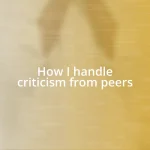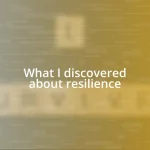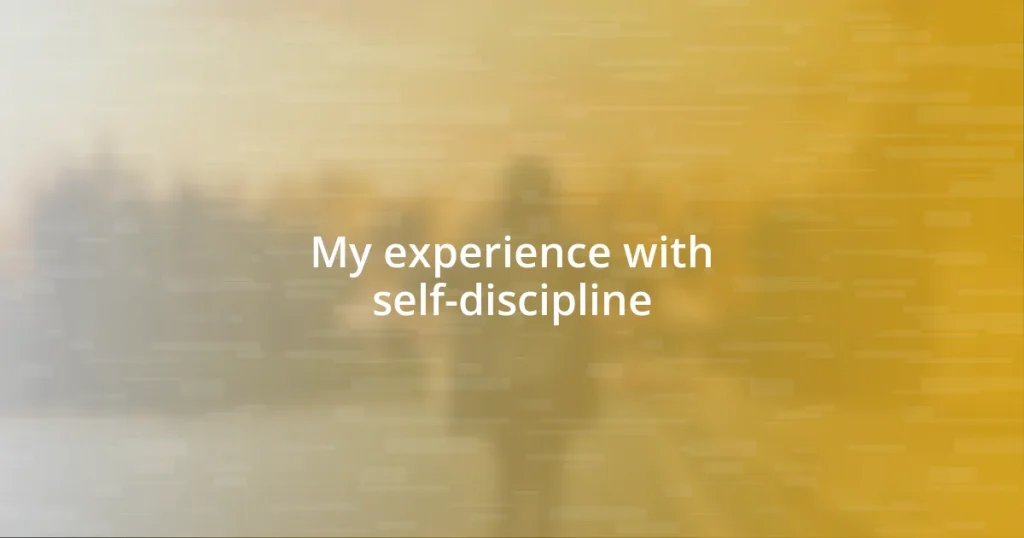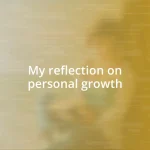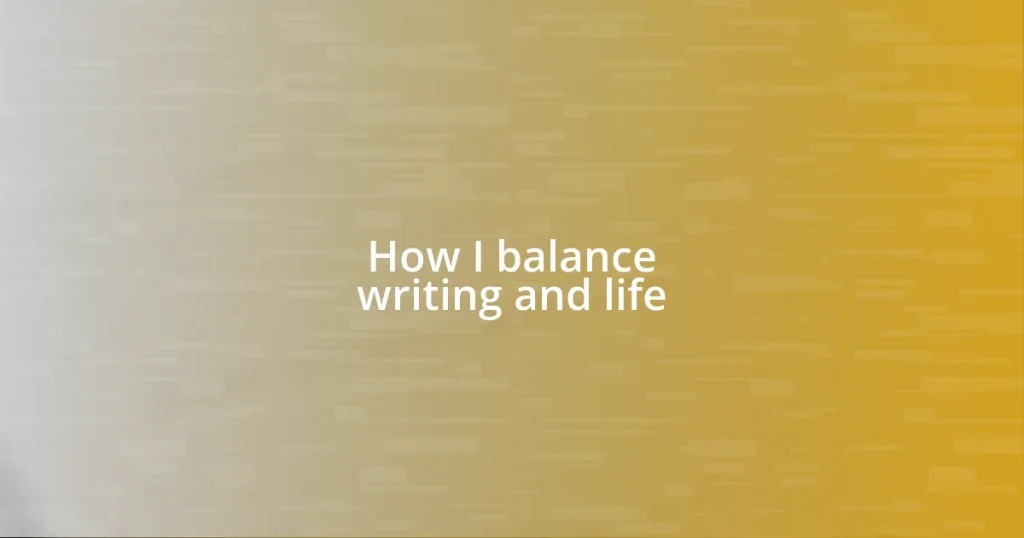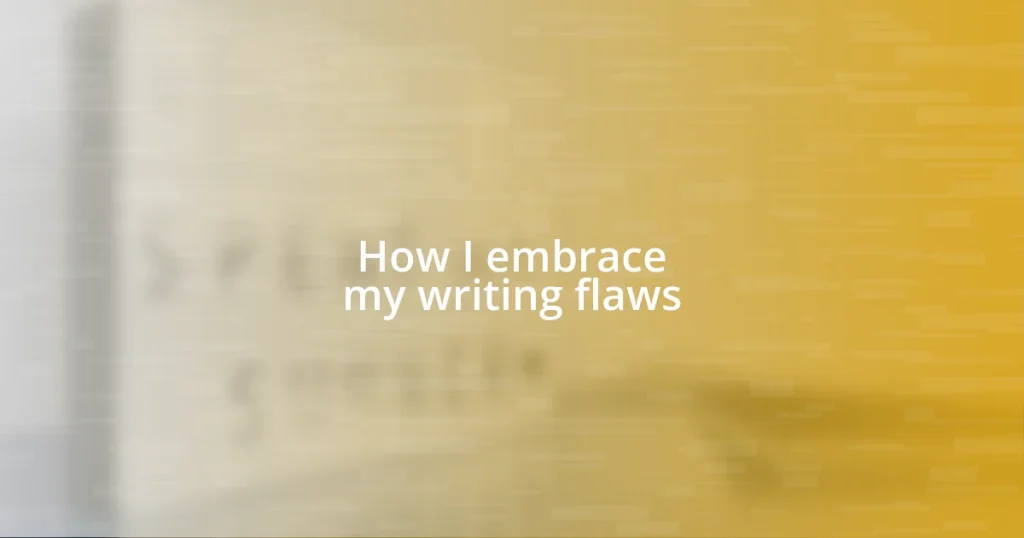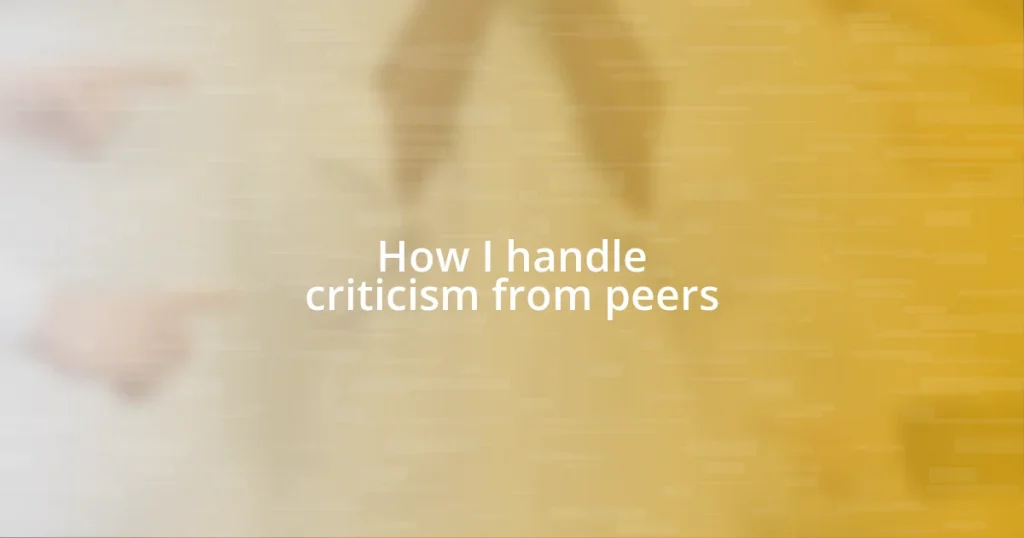Key takeaways:
- Self-discipline enhances personal resilience, allowing individuals to adapt and recover from setbacks while fostering growth.
- Identifying triggers for distractions is essential; recognizing these patterns can help establish healthier boundaries and improve focus.
- Setting specific, achievable goals and allowing for flexibility can transform daunting tasks into manageable and enjoyable routines.
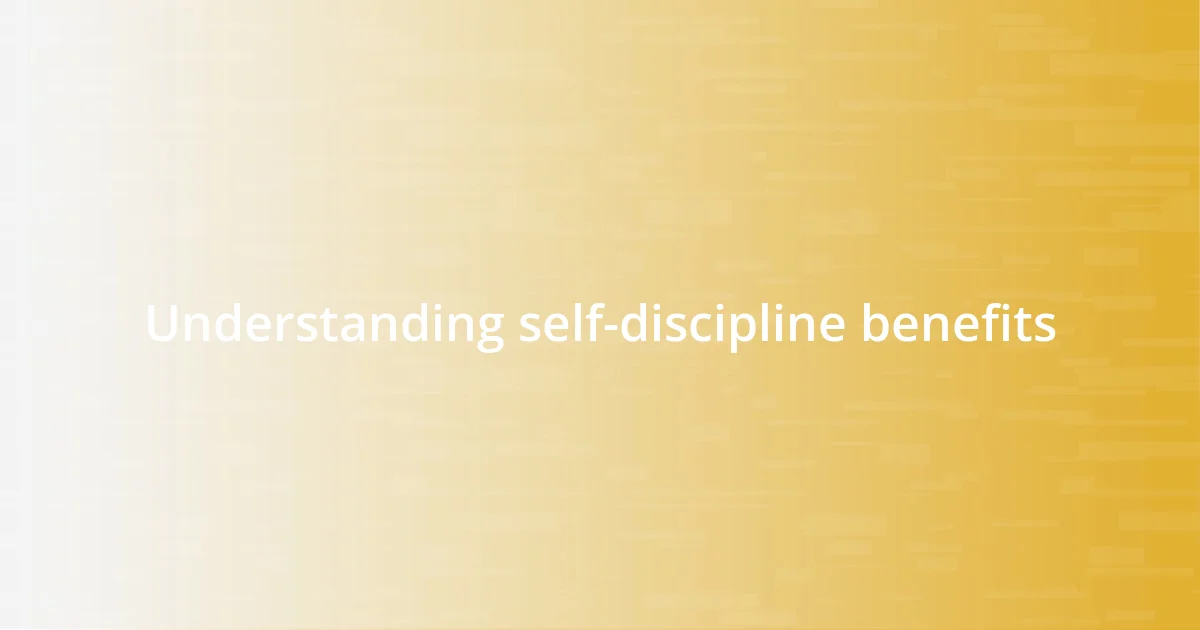
Understanding self-discipline benefits
Self-discipline is like having a superpower; it empowers you to make choices that align with your long-term goals rather than being swayed by short-term temptations. I remember a time when I decided to wake up early for my daily workouts instead of hitting snooze. Initially, it was tough, but as the weeks went by, I felt my energy levels soar and my mood improved. Isn’t it incredible how sticking to a routine can completely transform your day?
Moreover, self-discipline strengthens your resilience against life’s challenges. I once faced a major setback in my career that required me to reevaluate my entire approach. Instead of succumbing to frustration, I focused on developing a disciplined plan for my professional growth. This experience taught me that cultivating discipline is not just about avoiding distractions; it’s about building a foundation of perseverance. How often do we underestimate our ability to adapt and bounce back?
Finally, the ripple effect of self-discipline extends beyond personal achievements. It can positively influence your relationships by fostering trust and reliability. For instance, when I consistently followed through on my commitments to friends, I noticed that they began to rely on me more and reciprocate with their own commitments. Doesn’t it feel good when your actions foster a sense of community? Embracing self-discipline not only opens doors for personal success but also enriches the connections we share with others.
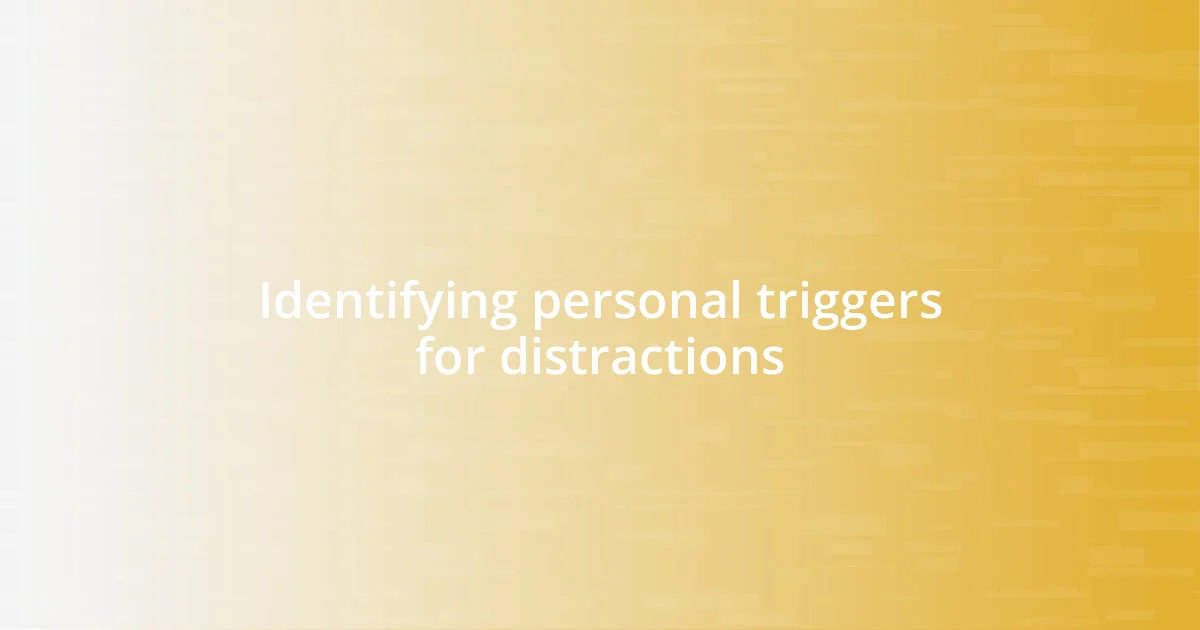
Identifying personal triggers for distractions
Identifying personal triggers for distractions is crucial in honing self-discipline. I learned this the hard way when I noticed I would get most distracted while scrolling through social media during work hours. It took some reflection to realize that stress from looming deadlines often led me to seek comfort in those fleeting posts. Recognizing this pattern has allowed me to establish healthier boundaries, like limiting my social media usage to specific times.
Here are some common triggers that can lead to distractions:
-
Emotional Stress: Feeling overwhelmed or anxious can push us to seek distractions.
-
Environmental Factors: Noisy surroundings or a cluttered workspace can divert attention.
-
Boredom: Sometimes, tasks that seem uninspiring can lead us straight to distractions.
-
Social Interactions: Conversations with colleagues or friends can break focus if not managed carefully.
-
Technology: Notifications from apps create constant interruptions that pull us away from tasks.
By pinpointing these distractions, I’ve developed strategies that help me maintain focus and make progress toward my goals. This isn’t always easy, but the awareness makes a significant difference in my day-to-day productivity.
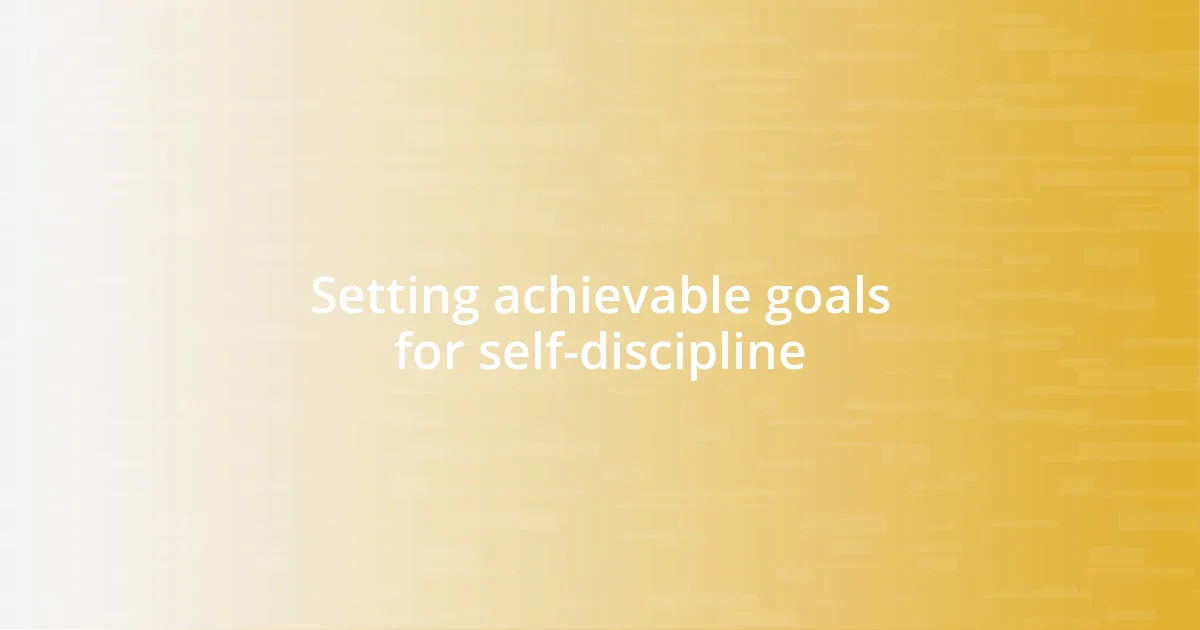
Setting achievable goals for self-discipline
Setting achievable goals is a cornerstone of developing self-discipline. I vividly remember when I decided to quit procrastinating and finally start a movie script I had been daydreaming about for years. I realized that setting a clear, attainable goal—like completing just one scene each week—made it feel manageable instead of overwhelming. This approach took the pressure off and allowed me to cherish the creative process, transforming a daunting task into an enjoyable weekly ritual.
When setting goals, it’s crucial to be specific and time-bound. For instance, instead of saying, “I want to read more,” I told myself, “I will read one chapter every evening before bed.” This shift gave me a structure that I could easily incorporate into my daily routine. The sense of achievement I felt after finishing each chapter boosted my motivation and encouraged me to continue. Have you ever experienced that wonderful feeling of accomplishment? It’s a powerful motivator that can propel you forward.
I find it helpful to revisit and adjust my goals as needed. Life is unpredictable, right? One time, I aimed to exercise four times a week, but after a month, I realized that the schedule was too ambitious alongside my work commitments. By scaling back to two or three sessions a week, I maintained my commitment without feeling overwhelmed. This flexibility has taught me that self-discipline is not about rigidity, but rather about adapting your goals to fit your life while still pushing for progress.
| Type of Goal | Characteristics |
|---|---|
| Specific | Clearly defined; easy to understand |
| Measurable | Includes criteria for tracking progress |
| Achievable | Realistic within time limits; not overly ambitious |
| Relevant | Aligns with broader personal aspirations |
| Time-bound | Includes a deadline for completion |
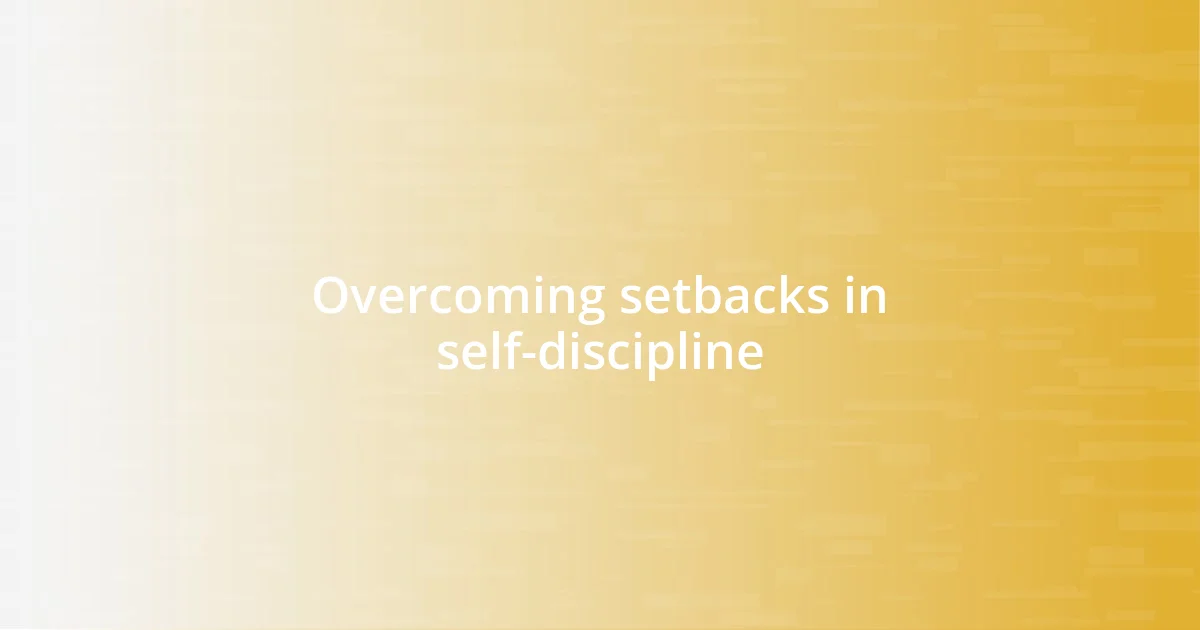
Overcoming setbacks in self-discipline
Sometimes setbacks in self-discipline can feel like stumbling blocks that stop us in our tracks. I once faced a period where I had committed to daily meditation but found myself skipping sessions repeatedly. It was disheartening at first, and I wondered if I was simply incapable of keeping promises to myself. However, this reflection led me to realize that I wasn’t giving myself grace. I started viewing those missed sessions not as failures, but as opportunities to learn what was interfering with my routine, which reignited my motivation.
Facing setbacks has taught me that it’s okay to reassess my strategies. There was a time when I committed to waking up at 5 AM, full of enthusiasm, only to snooze my alarm incessantly. Instead of beating myself up over it, I looked at what made that goal unmanageable. Adjusting my target wake-up time to 6 AM made a world of difference. Have you ever had to tweak your goals to keep them realistic? This kind of adaptability transformed frustration into a pathway that led me toward consistency.
Engaging with setbacks can actually fuel growth if approached with the right mindset. I always remember one particular moment when I hit a wall while trying to stick to a healthy eating plan. Instead of throwing in the towel after a few slip-ups, I wrote down what led to those cravings. Processing this made me more aware of my emotional triggers. Now, whenever I feel tempted to indulge, I ask myself what’s behind that urge. This practice doesn’t just help me stay disciplined—it’s become an enlightening self-reflection tool that deepens my understanding of my own behaviors.
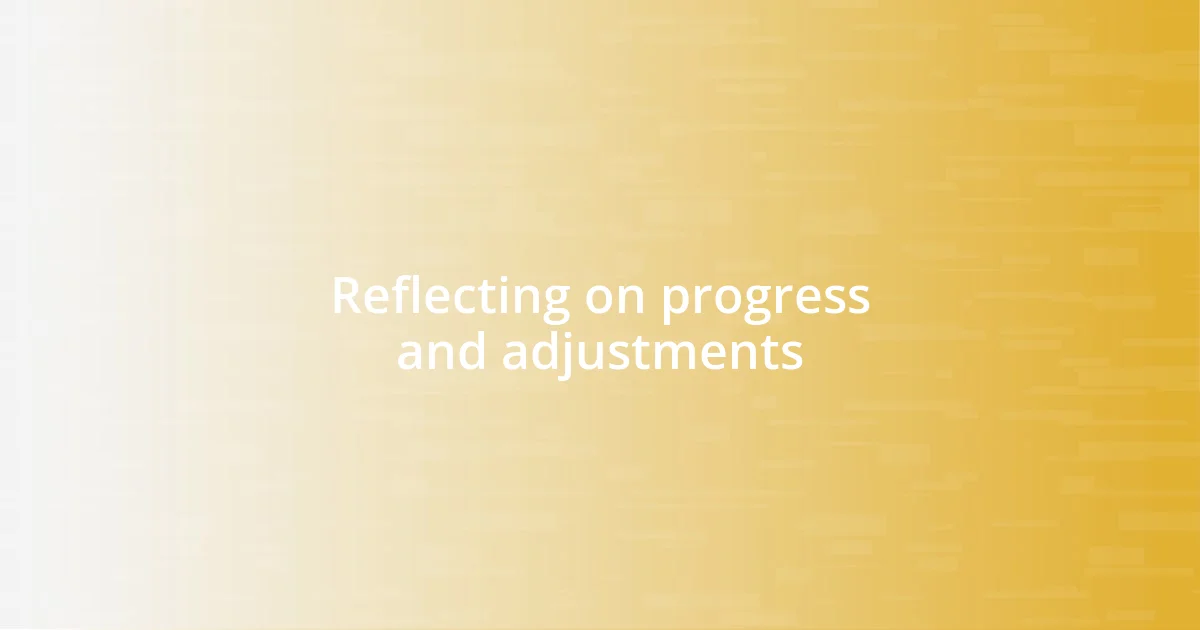
Reflecting on progress and adjustments
Reflecting on progress is a vital part of my journey with self-discipline. There was a phase when I meticulously tracked my habits in a journal, and flipping through those pages revealed an emotional rollercoaster of successes and setbacks. It made me realize how far I had come, yet highlighted areas that still needed work. Have you ever looked back at your own progress and felt a sense of pride mixed with the motivation to improve? That moment of reflection fuels my desire to keep moving forward.
Adjustments often come hand in hand with this reflection. I remember a time when I struggled with my writing goals, initially setting a target of 2,000 words a day. It seemed ambitious, but soon left me feeling overwhelmed. By recalibrating my target to 1,000 words—still challenging but more achievable—I found joy in writing rather than frustration. This experience taught me that flexibility is key. Isn’t it interesting how a small change can completely shift your perception and experience?
Moreover, reflecting on my emotional responses has become a game-changer. When I noticed myself feeling anxious about my discipline, I took a step back to assess my underlying feelings. Was I afraid of failing or not meeting expectations? Acknowledging these emotions allowed me to adjust not only my goals but also my mindset. Have you ever recognized that letting go of rigid expectations opens up space for growth? This understanding has helped me embrace the journey, enjoying every step while still striving for improvement.


